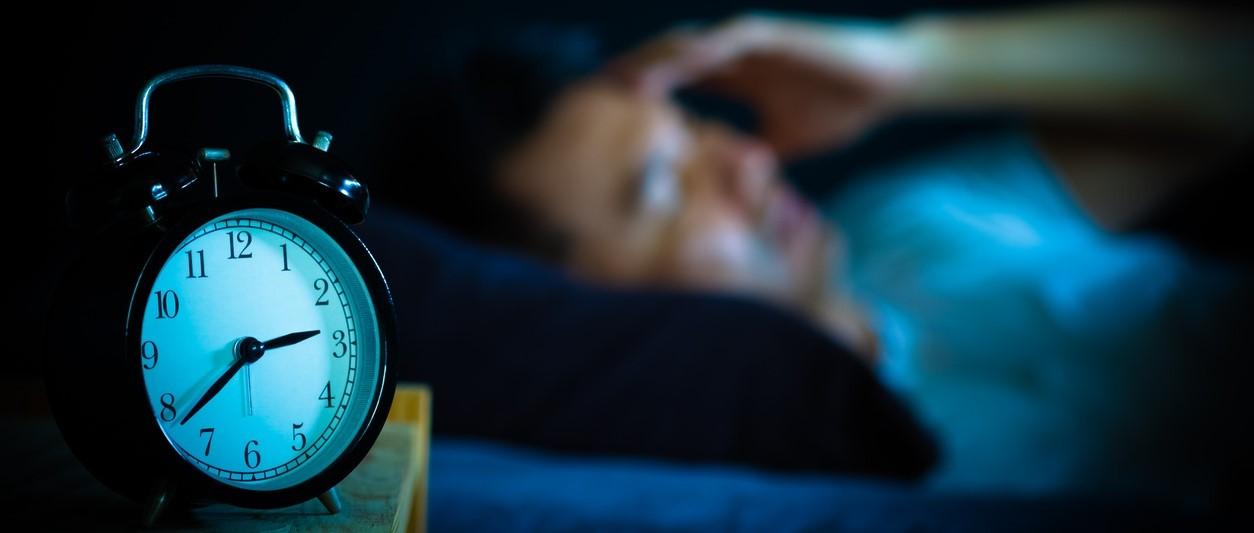
CBT for insomnia: how does it work?
Peer reviewed by Dr Krishna Vakharia, MRCGPAuthored by Amberley DavisOriginally published 17 May 2023
Meets Patient’s editorial guidelines
- DownloadDownload
- Share
- Language
- Discussion
If you struggle to sleep at night, it may be that unhelpful thoughts, behaviours, and habits are causing the problem. These can be hard to change on your own - and that's where CBT for insomnia can help. This therapy teaches you how to change the way you think about your sleep problems, which can be the key to solving them.
In this article:
Continue reading below
What is CBT?
Cognitive behavioural therapy, known as CBT, is an umbrella term for several types of talking therapies. These therapies emphasise that how you think affects how you feel and behave. By challenging unhelpful thought patterns, CBT can help you address, manage, and resolve a range of problems.
One such problem could be insomnia, which means poor sleep. Insomnia can affect people in different ways. Perhaps you struggle to fall asleep, wake up too early, or wake for long periods during the night. In any case, if you frequently miss out on a good night's sleep and feel that tiredness and other related symptoms are affecting your day-to-day, CBT could help you break the cycle.
How does CBT work for insomnia?
Back to contentsCBT for insomnia is a well-established and evidence-based treatment. Heather Darwall-Smith, psychotherapist and spokesperson for the UK Council for Psychotherapy (UKCP), says: "This therapy aims to help you establish healthy sleep habits and break the cycle of insomnia by addressing the underlying thoughts, behaviours, and habits that contribute to sleep difficulties."
She goes on to describe several stages of CBT for insomnia:
Sleep hygiene education - education on healthy sleep habits and the importance of establishing a consistent sleep routine. This might include not drinking caffeine or exercising in the evening.
Stimulus control - identifying and changing behaviours or environmental factors that may interfere with sleep, such as using the bedroom for activities other than sleep.
Sleep restriction/compression - establishing a consistent sleep schedule by limiting the time spent in bed to the actual amount of sleep obtained.
Cognitive restructuring - identifying and challenging negative or unrealistic/incorrect thoughts and beliefs about sleep that may contribute to insomnia.
Relaxation techniques - exploring a range of relaxation techniques, such as progressive muscle relaxation or deep breathing exercises, to help reduce anxiety and promote relaxation.
Dr Sarah Bateup is a leading cognitive behavioural therapist and chief clinical officer at Oliva. She adds that acceptance and commitment therapy (ACT) is an important part of CBT for insomnia:
“In ACT, we dig deep into all the things you might have tried to overcome insomnia so far - whether that's sleeping pills or getting a new mattress. We then assess together how effective these strategies have been at easing your symptoms."
Dr Bateup's patients often find that the things they’ve been doing to get rid of insomnia are actually making it worse - even just by making them focus on their sleep problems more.
"So, in ACT we also look at this vicious cycle and explore alternative strategies - which will often be the very opposite of what somebody has been trying previously. For example, we might explore what happens if, when trying to get to sleep, you were more mindfully aware of what it's like to be awake. Or, if instead of trying to get rid of insomnia, you try to make room for insomnia in your life."
Continue reading below
How effective is CBT for insomnia?
Back to contentsAs with all therapies, how well CBT works will depend on many factors. Your engagement and commitment to your sessions is important, but it can also depend on whether your insomnia is a symptom of something else that needs to be addressed.
If it's just that you're not great at sleeping, Dr Bateup says that ACT can be an incredibly effective treatment because "normalising, validating, and taking stock of the vicious cycle of trying to get rid of the symptom can help you to adjust and feel less helpless."
Many studies have proven just how effective CBT can be for insomnia. For example:
Research involving 1,162 participants found that CBT for insomnia significantly improved their sleep outcomes, including how long it took to fall asleep, how early they woke up, and their total sleep time1.
Studies have shown that the effects of CBT for insomnia can last for up to two years following treatment2.
A review of 75 studies found that the combination of cognitive therapy and behavioural techniques, such as sleep restriction, were the most effective components of CBT for insomnia for improving sleep outcomes3.
How long does it take for CBT for insomnia to work?
Back to contentsAccording to Darwall-Smith, the benefits of CBT for insomnia can typically be seen within a few weeks of starting treatment - which generally goes on for a six-to-eight-week period, in sessions lasting 60 to 90 minutes. The improvements in your sleep should continue after your therapy ends.
"This can vary depending on your needs, the severity of your insomnia, and whether there are co-existing conditions," adds the psychotherapist. "Some individuals may require additional sessions, and the length of treatment can be adjusted to accommodate your needs."
Where to get CBT for insomnia
In the UK, Dr Bateup and Darwall-Smith list the available avenues you could take.
The NHS
Your GP will assess your symptoms and determine if CBT for insomnia would be an appropriate treatment option. The NHS may also provide this therapy through a referral to a local psychological therapy service, access to a digital app - such as Sleepio and SleepStation - or, if needed, to a sleep clinic.
NHS website self-referral
You can go to the NHS website and type in IAPT, which stands for Improving Access to Psychological Therapies. You'll be asked to provide your post code and then will be shown information about your local IAPT service. In many cases, you can self-refer to your local service, but it will tell you what you need to do to gain access to CBT.
Private providers
You can also seek out private psychotherapists or psychologists specialising in CBT for insomnia. The BABCP website provides a list of accredited CBT therapists in your area. These providers may offer individual or group therapy sessions and may be covered by private health insurance.
Your workplace
You may be able to go through your workplace mental healthcare service and ask for CBT or Acceptance and Commitment Therapy.
Online
There are several online CBT for insomnia programmes available for you to access from the comfort of your own home. Some are free, while others require payment - Sleepio is only available through the NHS.
Self-help books
Several books provide guidance on CBT for insomnia techniques. These typically offer practical strategies for improving sleep, along with exercises and activities to help you implement these strategies. Darwall-Smith recommends Overcoming Insomnia and Sleep Problems: a self-help guide using cognitive behavioural techniques by Professor Colin Espie.
The availability of CBT for insomnia may vary, depending on where you live and your healthcare provider. Therefore, if you are interested in accessing this therapy, it's important to discuss your options with your healthcare provider or seek a reputable provider specialising in CBT for insomnia.
Continue reading below
Is CBT for insomnia suitable for everyone?
Back to contentsThere can be a whole host of reasons why this therapy can work wonders for some, but not so well for others. Darwall-Smith explains that CBT for insomnia may not be right for the following groups:
People with untreated medical or psychiatric conditions - disorders that are not well-managed may interfere with the effectiveness of this therapy. In such cases, it may be necessary to address these conditions before starting CBT for insomnia.
People with sleep disorders other than insomnia - this therapy is specifically designed to treat insomnia and may not be effective for other sleep disorders, such as sleep apnoea or restless leg syndrome.
People with severe insomnia - while CBT for insomnia can be effective for individuals with mild to moderate insomnia, it may not be sufficient for individuals with severe insomnia. In such cases, additional treatment may be necessary.
People with limited cognitive or emotional resources - this therapy requires active engagement and participation, which may be challenging for individuals with limited cognitive or emotional resources. In such cases, alternative treatment options may be necessary.
People who are unwilling or unable to commit to the treatment - CBT for insomnia requires a significant commitment of time and effort.
Further reading
Back to contentsPatient picks for Sleep and insomnia

Healthy living
Do you need more sleep in winter?
Feeling sleepy and sluggish in the middle of winter? You're not alone. We ask two sleep experts whether you really need more rest on colder, shorter days.
by Victoria Raw

Healthy living
Is getting a sleep divorce the key to better rest?
A sleep divorce is when two people who usually share a bed mutually decide to sleep separately to safeguard the quality of their rest. While it’s not for everyone, some find it’s the best solution if their health is impacted due to disrupted sleep. We dive into what a sleep divorce really involves, the potential health benefits, and the best ways to make it work. Ultimately, it’s up to you to decide whether the effects of better sleep outweigh the cost of sleeping apart from your partner.
by Victoria Raw
Article history
The information on this page is peer reviewed by qualified clinicians.
17 May 2023 | Originally published
Authored by:
Amberley DavisPeer reviewed by
Dr Krishna Vakharia, MRCGP

Ask, share, connect.
Browse discussions, ask questions, and share experiences across hundreds of health topics.

Feeling unwell?
Assess your symptoms online for free
Sign up to the Patient newsletter
Your weekly dose of clear, trustworthy health advice - written to help you feel informed, confident and in control.
By subscribing you accept our Privacy Policy. You can unsubscribe at any time. We never sell your data.